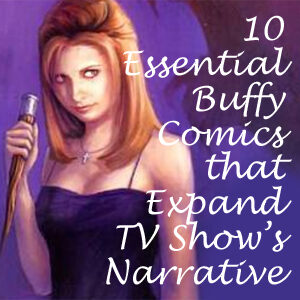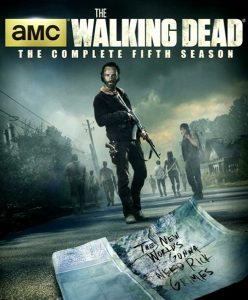Everyone is (rightly) reacting to the shocking end of Sunday’s mid-season finale of “The Walking Dead,” but the biggest moment in terms of reverberations for future stories might’ve happened before the opening credits. Bob No. 2 is running back to the hospital and doesn’t stop when Rick orders it from the police car’s loudspeaker. Rick rams Bob No. 2 with the car, then executes him in the street, following it up with an Eighties movie-style quip of “Shut up.” It’s a line that would make “Escape from L.A.’s” Snake Plissken proud — “Nobody draw until this hits the ground.” (He shoots everyone.) “Draw.”
Granted, we’ve seen hints of “Dark Rick” on the rise this season. He mows down some Termites from behind with a machine gun. After turning the tables on Gareth, he slaughters the cannibal cult leader in the church. But those were cases where the Termites had it coming – for God’s sake, they intended to kill and eat Rick and his friends, and indeed did cut off Bob No. 1’s leg and eat it. Last season, Rick rips a guy’s throat out with his teeth. That guy also had it coming, as he had threatened Carl, Daryl and Michonne.
But Bob No. 2’s only crime is escaping from Rick’s group. Aside from knocking out Sasha (and note that he probably could’ve done worse), Bob No. 2 doesn’t show much ill will toward Rick’s group. He certainly doesn’t have it coming the way the Termites did. That’s why I think this killing – and Rick’s lack of remorse over it – might lead to a slow-boiling “Dark Rick” arc.
Of course, Beth’s death will have repercussions, too. Beth’s older sister, Maggie, still has Glenn to latch onto, but I wouldn’t be surprised if Glenn is one of the next characters to die. It’d be interesting to see how Maggie would react to losing her dad, her sister and her husband within the span of a little more than a year.
I don’t know exactly how it will play out (that’s the joy of “The Walking Dead,” of course), but I have a feeling that the next major villain will come from within the group rather than from without. The show teased this concept a few seasons ago with Shane, but didn’t totally embrace it.
The mid-season finale also affirms that “Walking Dead” is, at its heart, a character drama. While I sometimes wonder what the show’s end game is (in the sense of “Lost’s” survivors wanting to get off the island), I don’t think an end game is the point of the show. Quite possibly, the characters aren’t really working toward an end game, either. Eugene’s revelation that he was lying about a potential cure in Washington, D.C., didn’t strike me as surprising; I suspected he was fibbing all along.
Rick and his group are told by a CDC agent in Season 1 that there is no cure for the zombie plague, yet they don’t argue much in the face of Eugene’s claim and Abraham’s determination to get to D.C. Part of this is because the CDC episodes don’t entirely eliminate hope of cure, but part of it is because hope is important even in a hopeless situation – they aren’t going to begrudge Abraham that. (Of course, Abraham doesn’t react well to losing the hopes he had pinned on Eugene, but now he’s working toward finding other reasons to keep on living.)

Ultimately, “The Walking Dead” has more in common with “Gilmore Girls” or “Parenthood” than “Lost” or a murder mystery like “The Killing” or even something with a tenuous sense of a goal, like “Angel” (where Angel’s vague end goal is to become human via the Shanshu Prophecy). While the postapocalyptic setting is different from a traditional family-based character drama, like those shows there is no end goal on “The Walking Dead.” It’s a show about living one’s life and forging relationships with other people.
The post-apocalyptic element’s biggest contribution – aside from the fact that zombies are cool – is that the life-or-death situations strip people down to their basic core. To cite one example, Sunday’s “Talking Dead” guest Keegan-Michael Key smartly noted that Daryl is the one to execute Dawn for killing Beth because Daryl has a deep-seated sense of justice. He doesn’t pontificate about post-apocalyptic morality all day as other characters (and bloggers) are wont to, but in that situation, he speaks with his weapon.
Interestingly, like most of Rick’s aforementioned victims (but not Bob No. 2), Dawn has it coming. Not strictly because her quick trigger-finger offs Beth, but rather because of her arrogant actions that lead to that moment. Dawn couldn’t leave the peaceful exchange of prisoners well enough alone; she demands Noah return to the hospital group.
(On a side note, I’m peeved at Noah for giving in to Dawn’s demand. It would’ve been immensely satisfying if Noah refused to comply and then Dawn found herself on the wrong side of everyone’s weapons, including those of her own group-mates. Also, I’m irked at Beth for stabbing Dawn with that scissors, arguably a suicidal move against someone like Dawn.)
Dawn’s belief that she could never compromise lest she lose some of her power ultimately results in Beth’s death, and her own. She has it coming, and Daryl sees that. Even if he hadn’t instinctively gunned her down, I suspect Daryl would’ve been OK with executing Dawn after a more formal judicial review.
Rick would’ve demanded Dawn’s scalp, too, but not purely for the sake of justice. Rick is moving into a realm of simply not taking people’s crap anymore, whether they are truly bad or merely annoying. Bring on the moral gray areas – and Dark Rick.

